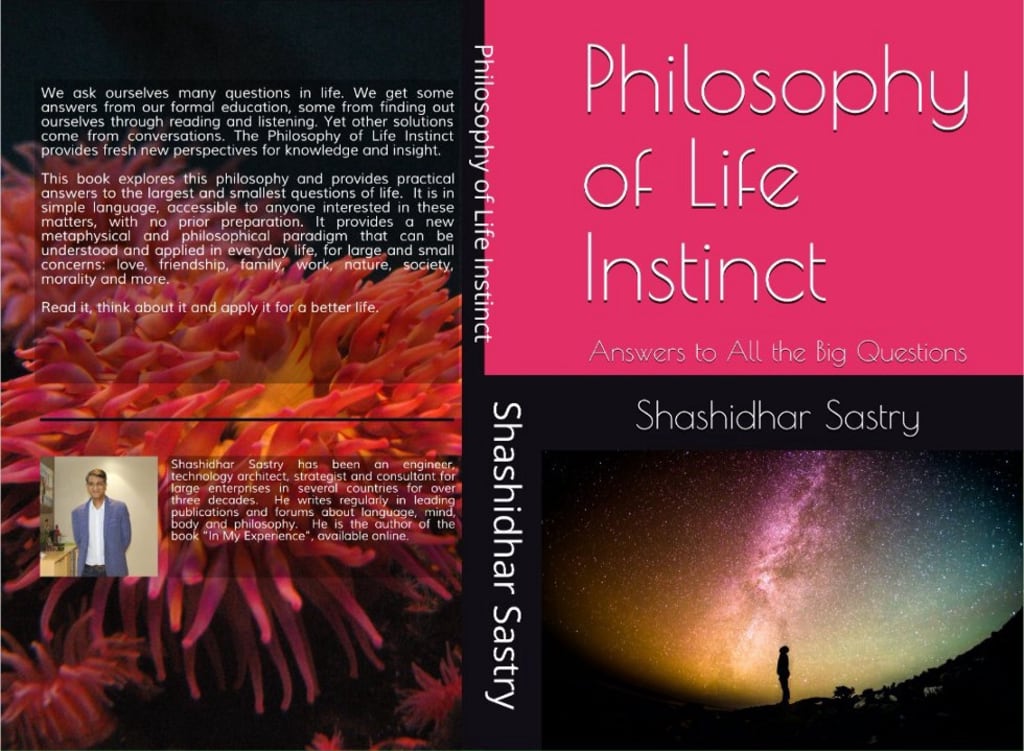Book: Philosophy of Life Instinct: Chapter 1: The Metaphysical Context
Why we first need to consider the universal questions

Perspective gives understanding. Detachment gives calmness. Oneness gives compassion. Together, it is wisdom.
Metaphysical thought gives us this perspective, detachment and sense of oneness.
The what of Metaphysics
Metaphysics is a subset and branch of philosophy that deals with the first principles, or direct first-hand questions - what is space, what is matter, what is time, what caused them, what can we know, how can we know?
Philosophy in its entirety covers various topics besides metaphysics, including indirect and humanly interpreted areas of inquiry such as logic, ethics, morality, government, aesthetics and more.
As we closely examine and understand the Life Instinct in this book, it will explain the life forms we know, and their behaviour. When we apply these insights to humans, it will provide answers to every domain's fundamental questions that concern us. The work is intended to be primarily philosophical in its scope, and the bulk of this book is concerned with the philosophical aspects because I believe we need to break new ground in this area.
However, by starting with a survey of the first principles, i.e. the metaphysics, we will provide our philosophy with the necessary foundations to strengthen and enrich it. There is also the possibility of solving far-reaching problems in future through metaphysical understanding. This is to be kept in mind, although it is not the main aim of this work.
Our areas of metaphysical inquiry
The primary metaphysical considerations that provide insights for our philosophy questions are covered concisely in chapters 2 and 3. These are related to the nature of reality and time. In truth, even these metaphysical questions could be given far more consideration in a broader context than is accommodated here. This is by design. Other metaphysical matters of the broadest scope have been left out as they have received ample inquiry from great minds, to which there is little I can add presently.
Then it is useful to consider the gulfs and relationships between these metaphysical explorations and life itself. This is taken up in chapter 4.
Chapters 5 and 6 move us into the areas of rational and scientific knowledge, discovery and thought, to close out part I in preparation for Part II - the human and interpretive concerns.
The limitations of our metaphysics
The biggest problem Metaphysics has is that it doubts its own validity. The doubting can be considered a strength, but it is based on genuine weaknesses.
Metaphysical questions are vital in their scope and implications - what exists, where did it come from, what is time, why do they exist, what caused them, what is the absolute nature of reality, is it all relative, illusory, what can we know, and how do we know? If the reader pauses a while to try and answer them for herself, the difficulties will be evident.
By their very nature, these direct experience questions are more challenging. There are two aspects to the problem - we may not be the only sentient beings in the universe, and even if we are, we are probably inadequate to address them.
The latter problem is the bigger issue. What we call matter and time, and the models, language and laws we use to understand them at every scale could be expedient and restricted. Even if we are the sole conscious beings in the universe, we may never comprehend reality in totality. All our ideas could be utilitarian constructs, of and for the specific life form we are, limited inherently to its practical purposes.
Then there is the former problem- the cosmos has not validated us. Within this apparently fantastic and complex universe, there is the added bewilderment of multiple life forms, just on our planet. And there could be infinite such planets, universes and life forms, like ours or incomprehensibly different. There is nothing to say we are special or ordained for the ultimate truths. Our cosmic imaginings could be illusory wisps at the edge of our imperfect minds. Nothing in a final sense has certified our existence, reality and understanding. They may never be provable. There is no cosmic dashboard we know of. There may not be one.
So, our metaphysical questions and explorations are not necessarily valid in any absolute context.
There is, of course, the contrary possibility. Applying Occam's Razor, the answer could be the simplest, that we are overthinking this and there is only one cosmos, and it is just as we experience it. And other life forms of any sort of experience and understand it similarly. In this view, everything we observe directly and indirectly through our scientific instruments is real and believable. Nevertheless, this viewpoint should still grant that our sensory organs and brains are limited and have a particular formulation that is incapable of complete insight and understanding. The metaphysical knowledge, even in this more straightforward possibility, could be restricted and distorted.
We need the humility to assume that our answers for the ultimate questions are the products of a species that could also be insignificant in two ways - our existence could be too short to be considered a success within our world, and we could be a relatively inferior intelligence in the wider cosmos.
Unlike our philosophy that can continue to evolve and become more useful for our lives, there could be severe limits on our Metaphysical understanding. We need to be aware of these constraints. It could be a natural part of our reality.
What then?
From our natural inclination and rationality, we cannot abandon our metaphysical and philosophical inquiries even if we deduce they are probably distorted, incomplete, and meaningless in an absolute sense.
Let us allow that an evolution of substance and life happened within our particular existence, whether real or imaginary. We will also allow that this evolution has progressed in a certain direction, most of the time. The ability to consider such metaphysical and philosophical questions is likely a part of our survivability, an evolved trait for exploiting and dealing with the circumstances in which we exist.
At the same time, we will posit that we have reached neither the limits of our direct and indirect knowledge nor of our mental faculties and not afford ourselves the hubris of intellectual maturity or finality.
This holistic, metaphysical situation imposes a necessary caveat on our philosophies, including the one in this book. In essence, we will take them as legitimate only within our world, i.e. within our phenomenal and intellectual spheres.
The utility of metaphysical inquiry
We know that other life forms on this planet do not require metaphysical answers to survive, even thrive. Then why have humans evolved to ask such questions? Could they serve a useful purpose for our lives, within the reality (or illusion) of our life form?
Some of our questions about reality may not even make sense to other sentient forms that could exist. They, in turn, could have metaphysical questions that we neither comprehend nor understand.
Therefore, the only reasonable answer is that our metaphysics arises out of our philosophy and strengthens it. The better our answers to metaphysical questions, the more control we have of our environment and our long-term survival.
One can state several advantages of metaphysical study, but three are pertinent for our purposes.
Firstly, when we consider the construct, bounds and evolution of the cosmos itself, we gain a healthy distance from immersion in our banal concerns. Just ponder - How big is our universe? Is it uniform? Where did it come from? Will it last forever? What does forever mean? What is time? Is it discrete or continuous? Does it flow the same everywhere? Is ours the only universe? How many could there be? Is there any limit? What about its scale? Is there a universe in a grain of sand? Is our universe in the grain of sand of another? There is no higher perspective than these contemplations.
Secondly, trying to understand the nature of experienced and mental entities dramatically demonstrates the limits of our cerebral capabilities, imaginative, logical and mathematical. Reflect carefully - What exists? Is there any solid matter? Is there a creator? Are numbers real? Are geometry and mathematics the same everywhere? Is logic infallible? How do entities come into being? What are causation and action at a distance? Are entities waves or particles? There is nothing better for our humility than pondering these questions once in a while.
Thirdly, if there are real entities, experienced or mentally constructed, how do we gain knowledge about them, i.e. their reality versus their appearance? Think hard about a round red ball - Does it seem round to only us and some other shape to a bird? Is the redness only for our eyes and brain? Is its solidity real or just our sensation? Is it really discrete, or is it just energy and waves? Is it still there when no one is looking at it? How can we prove that? These reflections completely expose the miasma in which we all exist together and make our differences seem laughably pathetic and childish.
Together, these three areas of thought engender our viewpoint's necessary elevation, openness to ideas, and disregard of human nature's trite aspects. This 'out-of-body' experience is necessary for useful progress in philosophical thought.
Asking, exploring and finding answers to metaphysical questions is our urge and our responsibility. Our life gives rise to philosophy and generates transcendental questions, but there are no ready-made answers for us.
Our philosophical frameworks are essential in the immediate, but the pondering of the metaphysical questions within them will help us in the longer term when humanity's prosaic intellect has reached its limits in ensuring our survival.
---
© 2020 Shashidhar Sastry. All rights reserved.
---
Previous Chapter






Comments
There are no comments for this story
Be the first to respond and start the conversation.